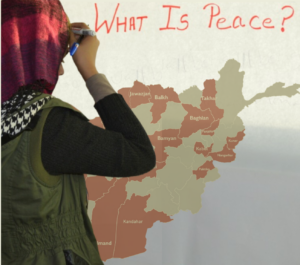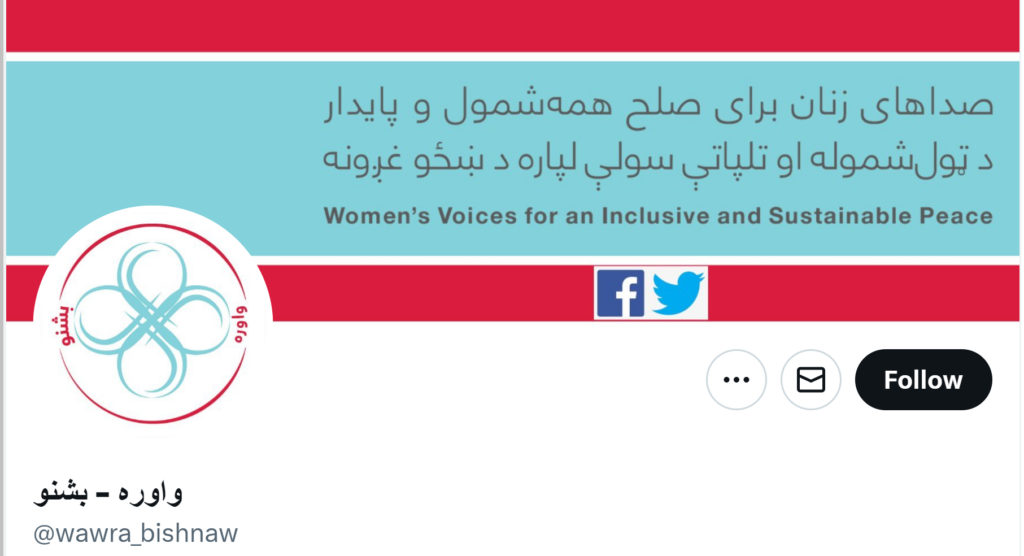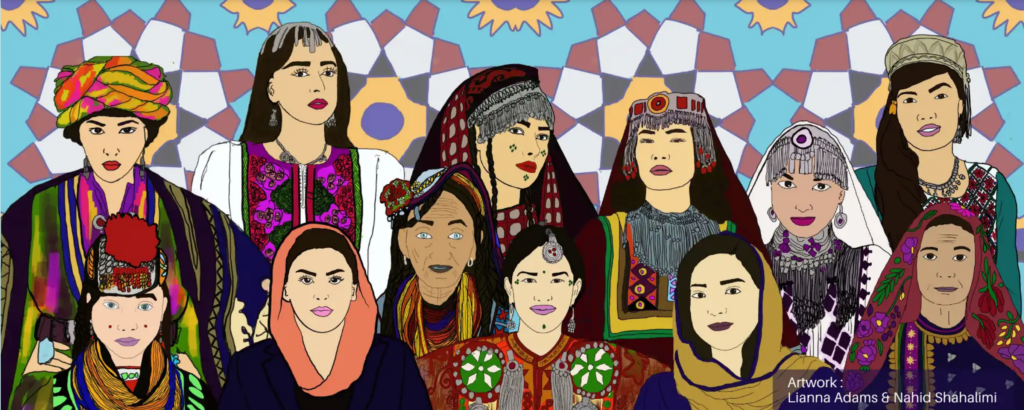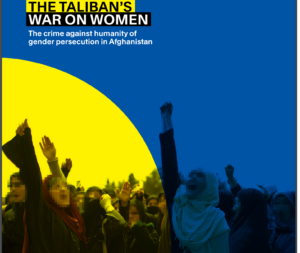Afghan women are demanding a restoration of their access to education and mobility, both essential for their ability to eventually provide for themselves and their communities, research confirms.
“There’s a narrative [in the media] right now that says Afghans are predominantly concerned with the humanitarian crisis,” says a leading women’s rights advocate. “But our data from women across nine provinces shows that right after that, women are most concerned about women’s rights and closure of girls’ schools.”
They report an atmosphere of fear enforced through targeted harassment, beatings, killings, and disappearances committed by the Taliban or other militant groups in the latest report from BISHNAW-WAWRA, an initiative of the Kabul-based Organization for Policy Research and Development Studies (DROPS). BISHNAW means listen in Dari and WAWRA in Pashto, and the group aims to capture the voices of women in real-time to ensure that ‘listening’ to Afghan women is not a one-off event but an integral part of all discussions on peace, security and development in Afghanistan.
 The report, Bringing Afghan Women’s Voices to the Foreground in Peace and Conflict by Dr Althea-Maria Rivas & Mariam Safi, draws on the voices of thousands of women across 17 Afghan provinces who replied to monthly surveys or took part in focus groups run by BISHNAW’s local pollsters.
The report, Bringing Afghan Women’s Voices to the Foreground in Peace and Conflict by Dr Althea-Maria Rivas & Mariam Safi, draws on the voices of thousands of women across 17 Afghan provinces who replied to monthly surveys or took part in focus groups run by BISHNAW’s local pollsters.
Respondents are dismissive of claims that the Taliban have at least brought a degree of security.
“Just because we are not hearing any terrifying voices of gunfire or explosions does not mean we have security,” said a participant from Baghlan. “When there is unemployment, poverty, and the school gates are closed for girls, this is called insecurity.”
“We do not have economic security, job security, mental or psychological security” – Member of BISHNAW’s Women’s Peace Circle, Faryab province.
Afghan women are equally dismissive of U.N. claims that corruption has diminished, arguing that it has simply taken more traditional, less financially sophisticated forms.
One respondent in Bamyan observed: “In a meeting with UNAMA [United Nations Assistance Mission in Afghanistan], many of the participants mentioned that most of the international aid is being sent to the Taliban themselves and is sold in the markets by them.”
 Far from seeing their rights as bargaining chips for aid, BISHNAW’s research confirms that Afghan women live in a reality where the mounting restrictions also affect their ability to survive, according to Samina Ansari, the manager and founder of Avyanna Diplomacy (@viasamina) and French-American writer Elliott Memmi. When asked “Do you think improving women’s rights should be as important for the U.N. as improving access to public services?” back in December, more than 80 percent of the 2,182 respondents agreed or strongly agreed, they write for The Diplomat:
Far from seeing their rights as bargaining chips for aid, BISHNAW’s research confirms that Afghan women live in a reality where the mounting restrictions also affect their ability to survive, according to Samina Ansari, the manager and founder of Avyanna Diplomacy (@viasamina) and French-American writer Elliott Memmi. When asked “Do you think improving women’s rights should be as important for the U.N. as improving access to public services?” back in December, more than 80 percent of the 2,182 respondents agreed or strongly agreed, they write for The Diplomat:
- And the data has been consistent over 2022 on what Afghan women want from the international community: regular U.N. consultations with Afghan women, a reinforcement of the U.N.’s ability to fulfill its mandate in human rights (contrary to claims that these are secondary considerations), and that the U.N. Security Council must demand unequivocally that the Taliban repeal all restrictions on women’s rights.
-
They are clear that the international community should not bend over backward to accommodate the Taliban in the hope of a dialogue or a compromise. It should not lower its standards for what can be accomplished in the realm of human rights. Rather, the international community should create as many ways as it can to get Afghan women unrestricted access to humanitarian aid and on-the-ground mechanisms that will hold the Taliban accountable for their actions.

Credit: BISHNAW-WAWRA
The BISHNAW Report highlights the importance of engaging with the realities and agency of Afghan women and provides an overview of DROPS’ unique approach to research and advocacy.
Mariam Safi (below), the director of DROPs, a partner of the National Endowment for Democracy (NED), has not allowed the chaos and shock of the Taliban takeover to stop her continuing her work from Canada, collecting crucial data from Afghanistan, specifically from women. After a brief hiatus, Safi improvised and restarted her work through a digital platform, with female researchers across Canada and Afghanistan working from home, The Guardian reports:
BISHNAW surveys have revealed a pattern of women being excluded from receiving international aid. “Of about 295 women, 163 told us that no women in their household had access to aid, contrary to the Taliban claims that women-led households were being provided aid. Only about five women out of 532 surveyed said all women have access at all.”
“Such data can actually provide [the international community] with a lot more leverage in their discussions with the Taliban,” she says. “In every meeting they are always asking, ‘What do Afghans want? What do women want? What are their concerns?’ We want to be able to provide data to answer those questions,” she says.
The thousands of women BISHNAW consulted are urging the UN to consult with diverse Afghan women and let their views inform decisions about engaging with the Taliban. “This will be particularly important in the coming weeks as we reach the UNAMA briefing in March,” says Safi. “The international community should not waste its time or financial support on any political process lacking [women’s voices].”

A new report from Amnesty International on The Taliban’s War On Women details what it calls “the crime against humanity of gender persecution” in Afghanistan (right).
A documentary about the lives of three women living under the Taliban, co-produced by Jennifer Lawrence, has premiered at the Cannes film festival. Bread and Roses, shown at a special screening on Sunday, follows three Afghan women in the weeks after the Taliban’s return to power in 2021 after the withdrawal of US troops, The Guardian reports:
Directed by Sahra Mani, whose 2018 documentary A Thousand Girls Like Me looked at a sexually abused woman’s quest for justice, the film aimed to show how the lives of women changed overnight under Taliban rule. “This film has a message from women in Afghanistan, a soft message: please be their voice who are voiceless under Taliban dictatorship,” said Mani at the premiere.
*A recent SOAS panel discussion (above) reflected on the BISHNAW-WAWRA report’s key findings and the challenges and opportunities for women’s voices in Afghanistan. Participants included Dr. Althea-Maria Rivas, Senior Lecturer, SOAS University of London (Chair and Report Co-Author) Baroness Fiona Hodgson of Abinger, House of Lords, UK Parliament Mariam Safi, Executive Director of Organization for Policy Research and Development Studies (DROPS) (BISHNAW report Co-author) Mirwais Wardak, Director of Peace Research and Training Organization Mark Bowden, Senior Research Associate, ODI Dr. Orzala Ashraf, Founding Director of Development Research Group Ltd.







